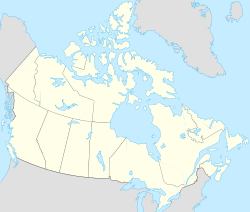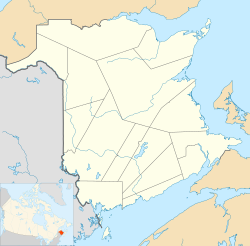Moncton
| Moncton | |||
|---|---|---|---|
| City | |||
| City of Moncton Ville de Moncton |
|||

From top left: Moncton skyline at night, the Capitol Theatre, Magic Mountain, Centennial Park, and Downtown Moncton at dusk
|
|||
|
|||
| Nickname(s): "Hub City" | |||
| Motto: "I rise again" | |||
| Location of Moncton in Canada | |||
| Coordinates: 46°07′58″N 64°46′17″W / 46.13278°N 64.77139°WCoordinates: 46°07′58″N 64°46′17″W / 46.13278°N 64.77139°W | |||
| Country |
|
||
| Province |
|
||
| County | Westmorland | ||
| Parish | Moncton Parish | ||
| First settled | 1733 | ||
| Founded | 1766 | ||
| Incorporated | 1855, 1875 | ||
| Government | |||
| • Type | Council-Manager | ||
| • Mayor | Dawn Arnold | ||
| • Governing Body | Moncton City Council | ||
| • MP | Ginette Petitpas Taylor | ||
| • MLAs |
Ernie Steeves Monique LeBlanc Chris Collins Cathy Rogers Sherry Wilson |
||
| Area | |||
| • City | 141.17 km2 (54.51 sq mi) | ||
| • Urban | 146 km2 (56 sq mi) | ||
| • Metro | 2,406 km2 (929 sq mi) | ||
| Highest elevation | 70 m (230 ft) | ||
| Lowest elevation | 0 m (0 ft) | ||
| Population (2011) | |||
| • City | 69,074 (79th) | ||
| • Density | 489.3/km2 (1,267.3/sq mi) | ||
| • Urban | 107,086 (27th) | ||
| • Metro | 138,644 (29th) | ||
| • Metro density | 57.6/km2 (149.2/sq mi) | ||
| • Demonym | Monctonian | ||
| Time zone | AST (UTC−4) | ||
| • Summer (DST) | ADT (UTC−3) | ||
| Canadian Postal code | E1A-E1G | ||
| Area code(s) | 506 | ||
| NTS Map | 021I02 | ||
| GNBC Code | DADHJ | ||
| Highways |
|
||
| Website | www |
||
| Sister cities |
|---|
|
|
|
|
|
|
Moncton (/ˈmʌŋktən/; French pronunciation: [mɔŋktœn]) is a city located in Westmorland County in the southeastern portion of the province of New Brunswick, Canada. Situated in the Petitcodiac River Valley, Moncton lies at the geographic centre of the Maritime Provinces. The city has earned the nickname "Hub City" due to its central inland location in the region and its history as a railway and land transportation hub for the Maritimes.
The city proper has a population of 69,074 (2011) and has a land area of 142 km2 (55 sq mi). The Moncton CMA has a population of 138,644 (2011), making it the largest CMA in New Brunswick, the second-largest CMA in the Maritime Provinces, and the third-largest CMA in Atlantic Canada. The CMA includes the neighbouring city of Dieppe and the town of Riverview, as well as adjacent suburban areas in Westmorland and Albert counties.
Although the Moncton area was originally settled in 1733, Moncton is considered to have been officially founded in 1766 with the arrival of Pennsylvania Dutch immigrants from Philadelphia. Initially an agricultural settlement, Moncton was not incorporated until 1855. The city was named for Lt. Col. Robert Monckton, the British officer who had captured nearby Fort Beauséjour a century earlier. A significant wooden shipbuilding industry had developed in the community by the mid-1840s, allowing for the civic incorporation in 1855, but the shipbuilding economy collapsed in the 1860s, causing the town to lose its civic charter in 1862. Moncton regained its charter in 1875 after the community's economy rebounded, mainly due to a growing railway industry. In 1871, the Intercolonial Railway of Canada had chosen Moncton to be its headquarters, and Moncton remained a railroad town for well over a century until the closure of the Canadian National Railway (CNR) locomotive shops in the late 1980s. Although the economy of Moncton was traumatized twice—by the collapse of the shipbuilding industry in the 1860s and by the closure of the CNR locomotive shops in the 1980s—the city was able to rebound strongly on both occasions. The city adopted the motto Resurgo after its rebirth as a railway town. At present, the city's economy is stable and diversified, primarily based on its traditional transportation, distribution, retailing, and commercial heritage, and supplemented by strength in the educational, health care, financial, information technology, and insurance sectors. The strength of Moncton's economy has received national recognition and the local unemployment rate is consistently less than the national average.
...
Wikipedia




